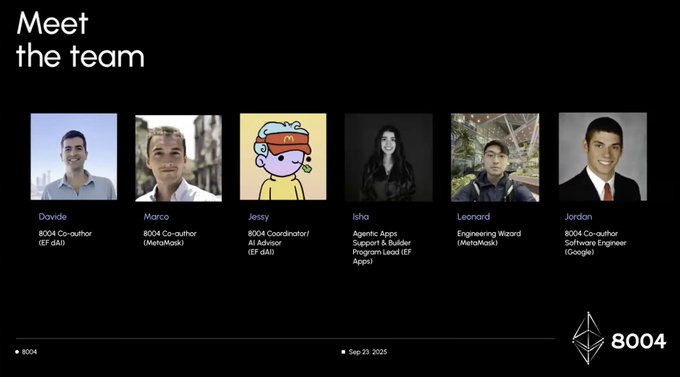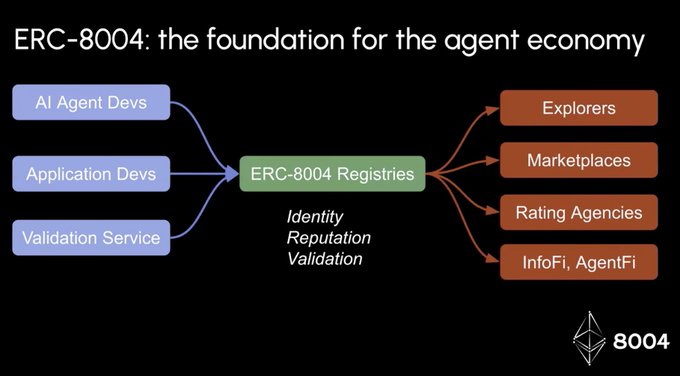Author: Pan Zhixiong
It is rare to see the Ethereum Foundation (EF) so vigorously promote an ERC standard, especially one related to AI Agents. This standard, known as "Trustless Agents," is actively pushed by EF's newly established decentralized AI team (dAI). EF has clearly listed ERC-8004 as an important component of its strategic roadmap, continuously providing resources and ecosystem collaboration through community conference calls, builders programs, and the DevConnect conference.
Why is ERC-8004 so important? It addresses the biggest issues in the current Agent service ecosystem—centralized trust bottlenecks and data silos—by proposing an open, permissionless, and trust-neutral infrastructure that enables Agent services to truly interact seamlessly across organizations and platforms, eliminating the control of centralized platforms over Agent services.
The core of this standard includes an identity registry, a reputation registry, and a verification registry, which address the three core questions: "Who am I?", "Am I trustworthy?", and "Is what I do independently verified?", forming a complete on-chain audit trail that thoroughly breaks the closed ecosystem of platforms.
ERC-8004 is not an isolated standard; it is based on the Agent-to-Agent (A2A) communication protocol open-sourced by companies like Google, filling in the decentralized trust layer that the original A2A protocol lacked, thus overcoming the limitation of the A2A protocol being applicable only in internal or trusted environments.
ERC-8004 is closely related to the development of AI. Currently, AI and Agent technologies are rapidly emerging but are concentrated in a few centralized large companies. ERC-8004 provides a decentralized foundation that allows any developer or team to create trustworthy and verifiable Agent services, preventing further centralization and monopoly of AI technology.
In terms of technical architecture, ERC-8004 adopts a "minimal on-chain" strategy, placing only key pointers and events on-chain while keeping complex data off-chain (such as IPFS). This allows verification services, payment systems, and Agent markets within the ecosystem to freely combine and expand, making the ecosystem more sustainable.
To adapt to different risk scenarios, ERC-8004 supports multiple trust models, including user feedback scoring, economic staking game verification (re-run verification), and TEE (Trusted Execution Environment)/cryptographic verification. Projects can freely choose the level of trust required, making it applicable to various scenarios such as healthcare, finance, and everyday consumption.
Since its release in August this year, ERC-8004 has quickly gained widespread support, with multiple teams already launching on-chain demonstrations and practical application cases, showing clear signs of early ecosystem prosperity. Various applications such as Agent registries, explorers, and verifiers have emerged one after another.
The next key milestone is the DevConnect conference hosted by EF in November 2025, where the practical application results of ERC-8004 will be showcased. The promotion and implementation of this standard are expected to reshape the internet and artificial intelligence economy, making Agent services a true public resource rather than the private domain of a few companies.
First meeting replay: https://youtube.com/watch?v=kooO3DGzYek


免责声明:本文章仅代表作者个人观点,不代表本平台的立场和观点。本文章仅供信息分享,不构成对任何人的任何投资建议。用户与作者之间的任何争议,与本平台无关。如网页中刊载的文章或图片涉及侵权,请提供相关的权利证明和身份证明发送邮件到support@aicoin.com,本平台相关工作人员将会进行核查。




